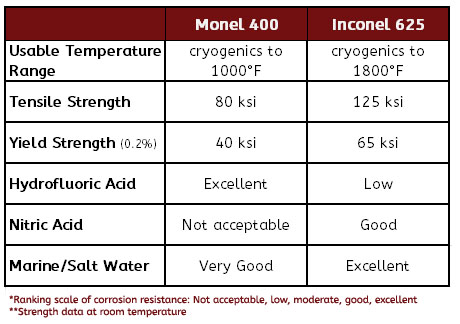Not sure what material is best for your application?
Contact an Expert
Search By Material
Search By Application
Tag Archives: Corrosion
Posted on January 8, 2018 by dean
Q: We have a corrosive application and we are debating on using coated carbon steel bolts and nuts or a solid corrosion resistant alloy. Obviously the coatings cost a lot less but we are unsure about how the coatings affect mechanical strength. A: Coated bolts and nuts are typically undersized … Continue reading →
Posted on November 15, 2017 by dean
Q: I have a high strength application that requires resistance to damp salt air and occasional sea splash, I’m using Monel 400 but it’s not holding up the the 75ksi of yield I need. Lots of broken bolts? Is is corrosion or strength? Thoughts? A: Your issue isn’t the corrosion. … Continue reading →
Posted in Application, Corrosion Resistance, FAQs, High Strength, Material, Specialty Metal Fasteners, Technical Questions | Tagged Alloy 400, Alloy K500, Corrosion, Duplex 2507, Duplex Steel, Monel, Monel 400, Monel K500, salt water, salt water corrosion, sea water corrosion, seawater | Leave a comment
Posted on November 14, 2017 by dean
Q: Is AL6XN a steel or nickel alloy? Trying to figure out if it would perform as well as Monel in seawater. A: To answer your first question, AL6XN bolts are actually both a nickel and a steel alloy. AL6XN is often described as a high nickel content stainless alloy. Though … Continue reading →
Posted in Application, Corrosion Resistance, FAQs, Material, Specialty Metal Fasteners, Technical Questions | Tagged AL-6XN, AL6XN, Alloy 400, Corrosion, Crevice Corrosion, Monel, Monel 400, pitting, pitting corrosion, salt water, salt water corrosion, sea water corrosion, seawater, stagnant salt water, stagnant water | Leave a comment
Posted on November 13, 2017 by dean
Q: I need bolts for a well pump exposed to sour gas? I’ve currently use Incoloy 825 bolts which works reasonably well, but I’m wondering if there is a better choice that is more economical and could offer equal or better corrosion resistance – any ideas? A: A great nickel alloy bolt … Continue reading →
Posted in Application, Corrosion Resistance, FAQs, Material, Specialty Metal Fasteners, Technical Questions | Tagged Alloy 825, Alloy C276, Corrosion, H2S, Hastelloy, Hastelloy C276, Incoloy, Incoloy 825, sour gas, sour gas well | Leave a comment
Posted on November 2, 2017 by dean
 Nickel alloys are a special class of metals containing high levels of nickel (often greater than 20%). They play a key role in industry for their unique combination of high strength, corrosion resistance to harsh acids (like hydrochloric and sulfuric) and high temperature stability. This two-part newsletter will help summarize the distinct benefits of the … Continue reading →
Nickel alloys are a special class of metals containing high levels of nickel (often greater than 20%). They play a key role in industry for their unique combination of high strength, corrosion resistance to harsh acids (like hydrochloric and sulfuric) and high temperature stability. This two-part newsletter will help summarize the distinct benefits of the … Continue reading →
Posted in Application, Blog, Corrosion Resistance, Material, Specialty Metal Fasteners | Tagged AL-6XN, AL6XN, Alloy 20, Alloy 400, Alloy K500, Carpenter 20, Corrosion, corrosion resistance, Monel, Monel 400, Monel K500, nickel, nickel alloys, Salt Water Resistance, Sea Water Resistance, Specialty Metals, Sulfuric Acid | Leave a comment
Posted on August 28, 2017 by dean
Q: Inconel 625 and Hastelloy C276 bolts seem to have similar Nickel content. Does this mean these fasteners will perform the same in a corrosive environment? A: Inconel 625 and Hastelloy C276 bolts do offer similar corrosion resistance but Hastelloy C276 has a slight edge in many acidic environements, especially … Continue reading →
Posted in Application, Corrosion Resistance, FAQs, Material, Specialty Metal Fasteners, Technical Questions | Tagged Acid, Acidic, Acids, Alloy 625, Alloy C276, Corrosion, corrosion resistance, H2SO4, Hastelloy, Hastelloy C276, HCl, Hydrochloric Acid, Inconel, Inconel 625, Oxidizing, Sulfuric Acid | Leave a comment
Posted on August 23, 2017 by dean
Q: I’m working with boiling sulfuric acid and tried Alloy 20 for some of my bolting but am having corrosion. I’m confused as I thought that is what they are best for. Any suggestions. A: You are right Alloy 20 does typically perform very well in sulfuric acid and even … Continue reading →
Posted in Application, FAQs, Material, Specialty Metal Fasteners, Technical Questions | Tagged Alloy 20, Alloy 20 Fasteners, Corrosion, H2SO4, H2SO4 corrosion, Hastelloy, Hastelloy C276, Hastelloy Fasteners, Inconel, Inconel 625, Inconel Fasteners, Sulfuric Acid, Sulfuric Acid Corrosion, tantalum | Leave a comment
Posted on July 25, 2017 by dean
 Hastelloy alloys have long been the gold standard of corrosion resistant bolts; only out performed by metals like Zirconium and Tantalum. This family of high performance nickel alloys can handle strong acids like hydrochloric, sulfuric, acetic, formic and phosphoric acids, yet each grade actually exhibits its own strengths in dealing with specific acids and niche environments. … Continue reading →
Hastelloy alloys have long been the gold standard of corrosion resistant bolts; only out performed by metals like Zirconium and Tantalum. This family of high performance nickel alloys can handle strong acids like hydrochloric, sulfuric, acetic, formic and phosphoric acids, yet each grade actually exhibits its own strengths in dealing with specific acids and niche environments. … Continue reading →
Posted in Blog, Material, Specialty Metal Fasteners, Uncategorized | Tagged Alloy B3, Alloy C2000, Alloy C22, Alloy C276, Boiling Acid, Corrosion, H2SO4, Hastelloy, Hastelloy B3, hastelloy C2000, Hastelloy C22, Hastelloy C276, HCl, Hot Acids, Hydrochloric Acid, nickel alloys, oxidizers, Oxidizing, Sulfuric Acid | Leave a comment
Posted on July 12, 2017 by dean
Q: I was planning on using Hastelloy C276 in hot sulfuric acid. It would be approximately 50% concentration around 100F +/- 10 degrees. Will this be okay? I’m just concerned because I read that it cannot handle strong oxidizing environments and I’ll be using it in an application where its … Continue reading →
Posted in Application, Corrosion Resistance, FAQs, Material, Specialty Metal Fasteners, Technical Questions | Tagged Alloy C22, Alloy C276, Corrosion, ferric chloride, H2SO4, Hastelloy, Hastelloy C22, Hastelloy C276, Hot Sulfuric Acid, Nitric Acid, Oxidizer, Oxidizing, Sulfuric Acid | Leave a comment
Posted on July 10, 2017 by dean
Q: I have a salt water environment with high velocities and a lot of debris including sand, dirt and particles. Because of the amount of debris, I’m concerned about what material would work best. A: Both Monel and Titanium can be good choices in this situation. Both perform extremely well … Continue reading →
Posted on June 1, 2017 by dean
These two alloys are often confused as being almost the same, which is almost true. They are both nickel alloys and share many key characteristics. AL6XN and Alloy 20 are alike in that they each retain their strength to about 1000°F. In addition they both perform well, in salt water environments, … Continue reading →
Posted in Blog | Tagged acid resistance, AL6XN, Alloy 20, Carpenter 20, Corrosion, corrosion resistance, Nickel Alloy, Sulfuric Acid | Leave a comment
Posted on May 25, 2017 by dean
Q: I’m using zirconium fasteners in a sulfuric acid process but they are showing corrosion. I’m not sure why as I’m well below boiling and only using 40% concentration. There may be some downstream contaminants, but not much. Any ideas? A: It is most likely the contaminants that are causing … Continue reading →
Posted in Application, Corrosion Resistance, FAQs, High Temperature Resistance, Material, Specialty Metal Fasteners, Technical Questions | Tagged Alloy 625, Alloy C22, Alloy C276, C22, C276, Corrosion, corrosion resistance, Ferric chlorides, H2SO4, Hastelloy, Hastelloy C22, Hastelloy C276, Inconel, Inconel 625, oxidizers, oxidizing media, Sulfuric Acid, tantalum, Zirconium | Leave a comment
Posted on May 24, 2017 by dean
Q: I’m running a steam surface condenser which is installed on a steam turbine in a thermal power station. I’m using sea water that could be contaminated with chemical pollutants cooling water side of the condenser. Any ideas on a good fastener for the tubes and water boxes? A: Duplex 2205 … Continue reading →
Posted in Application, Corrosion Resistance, FAQs, High Temperature Resistance, Specialty Metal Fasteners, Technical Questions | Tagged AL6XN, Alloy 2205, chloride corrosion, Corrosion, Crevice Corrosion, Duplex, Duplex 2205, High Temperature, pitting corrosion, salt water corrosion, Steam condenser, steam surface condenser, Stress Corrosion Cracking | Leave a comment
Posted on May 18, 2017 by dean
q: What bolting material should be used with Inconel 625 flanges? We used ASTM A193 Gr B7 however noticing some corrosion issues. A: This is a very common problem but to answer it accurately, it depends on the environment that your flanges see and also to a certain extent what … Continue reading →
Posted in Application, Corrosion Resistance, FAQs, Specialty Metal Fasteners, Technical Questions | Tagged Alloy 625, Alloy 718, B7, Corrosion, flange, Galvanic Corrosion, Inconel, Inconel 625, Inconel 718 | Leave a comment
Posted on May 11, 2017 by dean
 They rhyme, are both used in extreme environments, and are both nickel metal alloys, but Monel and Inconel are actually very different. But how? Let’s start with basic chemistry. Monel is a nickel-copper alloy and Inconel is a nickel-chromium alloy. So what does that mean for your extreme application? We … Continue reading →
They rhyme, are both used in extreme environments, and are both nickel metal alloys, but Monel and Inconel are actually very different. But how? Let’s start with basic chemistry. Monel is a nickel-copper alloy and Inconel is a nickel-chromium alloy. So what does that mean for your extreme application? We … Continue reading →
Posted in Application, Blog, Corrosion Resistance, High Strength, High Temperature Resistance, Specialty Metal Fasteners | Tagged Alloy 400, Alloy 625, Corrosion, hastelloy C2000, High Temperature, Hydrofluoric acid, Inconel, Inconel 625, Monel, Monel 400, saltwater corrosion, sea water corrosion | 1 Comment
Posted on April 7, 2017 by dean
Q: I have a seawater application where the water can be stagnant or polluted. Is Monel bolts the best choice? A: For stagnant seawater application we would usually suggest Titanium over Monel fasteners. Although Monel is very resistant to saltwater, it can experience pitting corrosion in stagnant water situations. There have … Continue reading →
Posted in Corrosion Resistance, FAQs, Specialty Metal Fasteners, Technical Questions | Tagged Corrosion, Monel, seawater, Titanium | Leave a comment
Posted on February 8, 2017 by dean
Q: Can dissimilar (also called galvanic) corrosion occurs between Inconel bolts and regular carbon steel? A: Anytime you have dissimilar materials you have the potential for galvanic corrosion. For this to happen the materials need to be wet or in some kind of solution. If they are dry it’s … Continue reading →
Posted on November 11, 2015 by dean
 Sulfuric Acid (H2SO4) is one of the most widely used and industrially important acids in modern society, being an essential component in the production of polymers, fuels, pharmaceuticals, electronics, and mining. While sulfuric acid is commonly used, enabling fasteners to survive in this environment is not always an easy task. To help you tackle this feat, … Continue reading →
Sulfuric Acid (H2SO4) is one of the most widely used and industrially important acids in modern society, being an essential component in the production of polymers, fuels, pharmaceuticals, electronics, and mining. While sulfuric acid is commonly used, enabling fasteners to survive in this environment is not always an easy task. To help you tackle this feat, … Continue reading →
